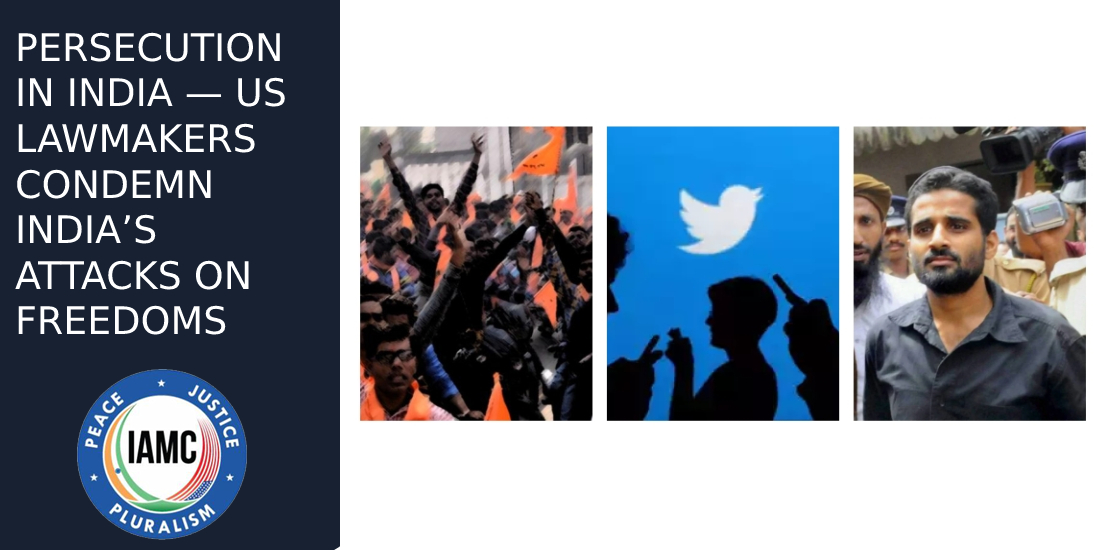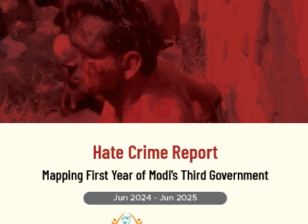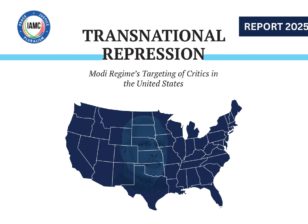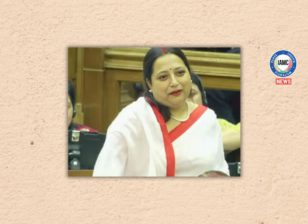US Senator, 3 Congressmen Condemn India’s Human Rights, Religious Freedom Violations
International lawmakers and human rights defenders, including US Senator Ed Markey (MA), Congressman Jim McGovern (MA), Congressman Jamie Raskin (MA), and Congressman Andy Levin (MI), condemned Prime Minister Narendra Modis’ government for its ongoing abuses of human rights and religious freedoms.
Speaking at a Special Congressional Briefing organized on January 26 to mark India’s Republic Day, Senator Markey said, “As the Indian government continues to target the practices of minority faiths, it creates an atmosphere where discrimination and violence can take root. In recent years, we have seen an uptick in online hate speech and acts of hate, including vandalized mosques, torched churches, and communal violence.”
“It is the duty of the United States to speak out when fundamental human rights are under attack no matter where, but even more important, when they take place in India, a vital US partner.”
Condemning the abuse of harsh anti-terror laws to crack down on journalists, activists, lawyers, and other civilians, Congressman McGovern said, “This kind of misguided antiterrorism legislation is not the sign of a healthy democracy. We cannot be silent when measures are taken that discriminate against whole populations or when inflammatory language is used that could incite violence against those populations.”
Other speakers included Nadine Maenza, Chair of the United States Commission for International Religious Freedom (USCIRF); Hamid Ansari, Former Vice-President of India; Ameenah Gurib-Fakim, Former President of Mauritius; Archbishop Peter Machado, Archdiocese of Bangalore; Kerry Kennedy, President of Robert F. Kennedy Human Rights; and Carolyn Nash, Asia Advocacy Director at Amnesty International USA. These advocates denounced India’s rising Hindu supremacist movement, which has led to increased physical and systemic violence against India’s Muslim and Christian minorities.
“In recent years, we have experienced the emergence of trends and practices that dispute the well-established principle of civic nationalism and interpose a new and imaginary practice of cultural nationalism,” said Dr. Ansari. “It wants to distinguish citizens on the basis of their faith, give vent to intolerance, insinuate otherness, and promote disquiet and insecurity.”
He also urged taking action against these human rights offenses by saying, “These trends need to be contested legally and contested politically.”
Speaking on the reasoning behind USCIRF’s decision to label India as a Country of Particular Concern (CPC) for its repeated and egregious violations against religious minorities, Maenza said, “Mobs empathetic with Hindu nationalism acted with impunity and at times were assisted by authorities, even police, in targeting religious minorities in places of worship. Sectarian violence is enabled by hate speech and disinformation propelled by government officials. Civil society lacks the freedom to document or raise their voices against gross human rights and religious freedom violations.”
Nash, Kennedy, and Archbishop Machado all echoed these sentiments, calling for the Indian government to heed international warnings and put an end to its slide towards authoritarianism.
The briefing was organized by a coalition of advocacy organizations. Citing concerns over the repeated attacks on Indian pluralism and democracy under Prime Minister Narendra Modi and the Bharatiya Janata Party (BJP), Senator Markey said that it was imperative that the United States not allow such attacks to slide under the radar.
Indian Government Invades Citizens’ Right To Free Speech By Demanding Their Data From Twitter
In its annual transparency report, Twitter reported that the Indian government asked the company for data on 2,200 user accounts between January and June 2021. There were also nearly 5,000 demands for Twitter to remove India-based accounts, demonstrating the Indian government’s continued obsession with cracking down on any activists, academics, and civilians who attempt to speak out against India’s egregious violations against vulnerable minorities.
This is just the latest in a longstanding trend where the Indian government uses any means possible to silence critics of Prime Minister Modi, the BJP, and supporters of the Hindu nationalist movement. In BJP-ruled Tripura state, following an outbreak of Hindu extremist mob attacks on Muslim homes and mosques, police booked journalists under draconian anti-terror laws simply for tweeting the news about the hate crimes. In Kashmir, which remains under brutal Indian military occupation, journalists and civilians alike have been arrested for “sedition” and “terrorism” for tweeting about protests and other acts of resistance against the Indian government.
Meanwhile, Modi remains sluggish in his response to rape fantasy apps, chatrooms, and forums circulating on social media, which Hindu extremists use to harass, humiliate, and dehumanize Muslim women. Modi has yet to condemn lewd remarks made about Muslim women on Reddit and Clubhouse, where his fervent supporters fantasize about a “Hindu nation” where “all mannequins are replaced by [Muslim women],” as well as mock auction apps Bulli Bai and Sulli Deals, which advertised unwitting Muslim women as prostitutes.
On Facebook, it is common for vitriolic anti-Muslim posts to remain on the platform despite being reported, while WhatsApp is used to spread fake news and organize Hindu extremists groups. Modi has also been extensively criticized for following “serial abusers” on Twitter, but has not attempted to distance himself from them.
In Setback For India’s Premier Anti-Terror Agency NIA, Appeals Court Acquits Muslim Men Jailed On False Charges In Kerala
Two Muslim men, Thadiyantavide Nazeer and Shafaz, were acquitted by the Kerala High Court of false charges of terrorism, on which they had been sentenced to life for after a chargesheet was filed against them in 2011. Both men had been accused of executing a terror attack in 2006, where two bombs were planted near a bus stand in Kerala state. They were subsequently arrested under India’s draconian anti-terror law, the Unlawful Activities Prevention Act (UAPA), which allows the government to designate individuals as terrorists.
The blast took place on March 3, 2006 at a bus stand in Kozhikode city. The federal National Investigation Agency (NIA) took it over in 2009. Nazeer and Shafaz, the first and fourth accused in the case, had filed an appeal seeking to quash the life sentence imposed on them by a lower court. The duo refuted the trial court’s finding that they had committed offences under the draconian UAPA.
The UAPA has been abused by the Indian government and weaponized against minorities, particularly Muslims. Current victims of the UAPA include Muslim Kashmiri human rights defender Khurram Parvez, whose arrest was decried by the Office of the United Nations High Commissioner for Human Rights; Muslim journalist Siddique Kappan, who was detained for attempting to report on a brutal rape case; and Muslim activists Umar Khalid and Sharjeel Imam, who played a central role in protests against India’s discriminatory Citizenship Amendment Act (CAA).




